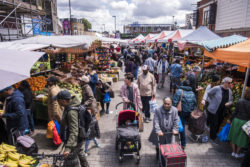New handbook for market operators launched at NMTF Conference

Ridley Road Market, Hackney, London (Hackney Council)
Download the Operator Handbook and Dr Sara González presentation to the NMTF Conference.
This best practice handbook is a practical guide for market operators on how to operate and develop traditional retail markets (TRMs) as community hubs for inclusive economies. Concerns about the gentrification of TRMs have increased in the UK in recent years, prompting many market operators to seek out advice and examples of how to avoid, minimise or balance it. This handbook provides a starting point for any market operator interested in pursuing an inclusive, community-oriented and holistic approach to operating and developing TRMs, drawing together a wide-range of innovative case studies from across the UK.
The handbook is an output of the 3.5 year Markets4People research project, a collaboration between researchers from the University of Leeds and the Open University, NMTF (the organisation representing market traders in the UK) and the New Economics Foundation. Building on the previous work of NMTF and NABMA (the organisation representing market operators in the UK), the project aimed to generate new tools, evidence and proposals for understanding and enhancing the community value of TRMs in the UK. Through a survey of 1,500 users of exemplary UK TRMs, the Markets4People project produced powerful quantitative evidence of the community value TRMs deliver for their customers, in particular for low-income and other marginalised or vulnerable groups. 50 interviews, 20 follow-up discussions and six workshops then enabled the project to identify and explore some of the ways in which market operators were already innovating to enhance the community value of TRMs. While some of these examples are already promoted by the key market sector organisations NMTF and NABMA, this handbook brings them together for the first time as part of a broader approach and agenda for operating and developing TRMs as community hubs for inclusive economies. This approach supports and enhances TRMs’ wide-ranging roles and functions, contributing to an inclusive and community-oriented recovery of high streets, town centres and local economies from the Covid-19 pandemic, as well as many other local authority policy areas and responsibilities.
The handbook offers an alternative to previous approaches to developing TRMs, which have been informed by twin narratives of decline and gentrification. On the one hand, TRMs have been framed as retail spaces from a bygone era managed by financially struggling local authorities who no longer see much purpose for them. On the other, they have been reframed and redeveloped as trendy, food and leisure destinations for young and professional customers to attract footfall and vibrancy to town centres and high streets. In the process, existing traders and customers can often be marginalised as rents become higher and markets change their atmosphere and offer. This is a problem because the customer base of TRMs includes groups of people already suffering from isolation or multiple vulnerabilities who rely on markets for affordable provisioning and opportunities for social interaction. Although these twin narratives of decline and gentrification are extremes and most markets fall somewhere in between, the tension between the two has been present in most discussions about the future of TRMs in recent years amongst operators, traders and community groups.
This handbook provides a new and freely accessible resource for any market operator looking to pursue an inclusive, community-oriented and holistic approach to operating and developing TRMs while avoiding gentrification. It is aimed primarily at local authorities, which operate 82% of markets in the UK, but will also be relevant to private operators (10%) and markets operated by cooperatives, social enterprises and community interest companies (8%). The handbook will be useful not only for markets teams but also other teams working on the wider suite of local authority goals and responsibilities to which TRMs contribute, including Covid-19 recovery, high streets, economic development, public health, food policy, climate change and social inclusion. While its main focus is on TRMs, which provide a relatively low-cost and wide-ranging offering to predominately low-income communities, it will also be relevant to farmers and specialist markets seeking to develop their community value and serve low-income communities.
